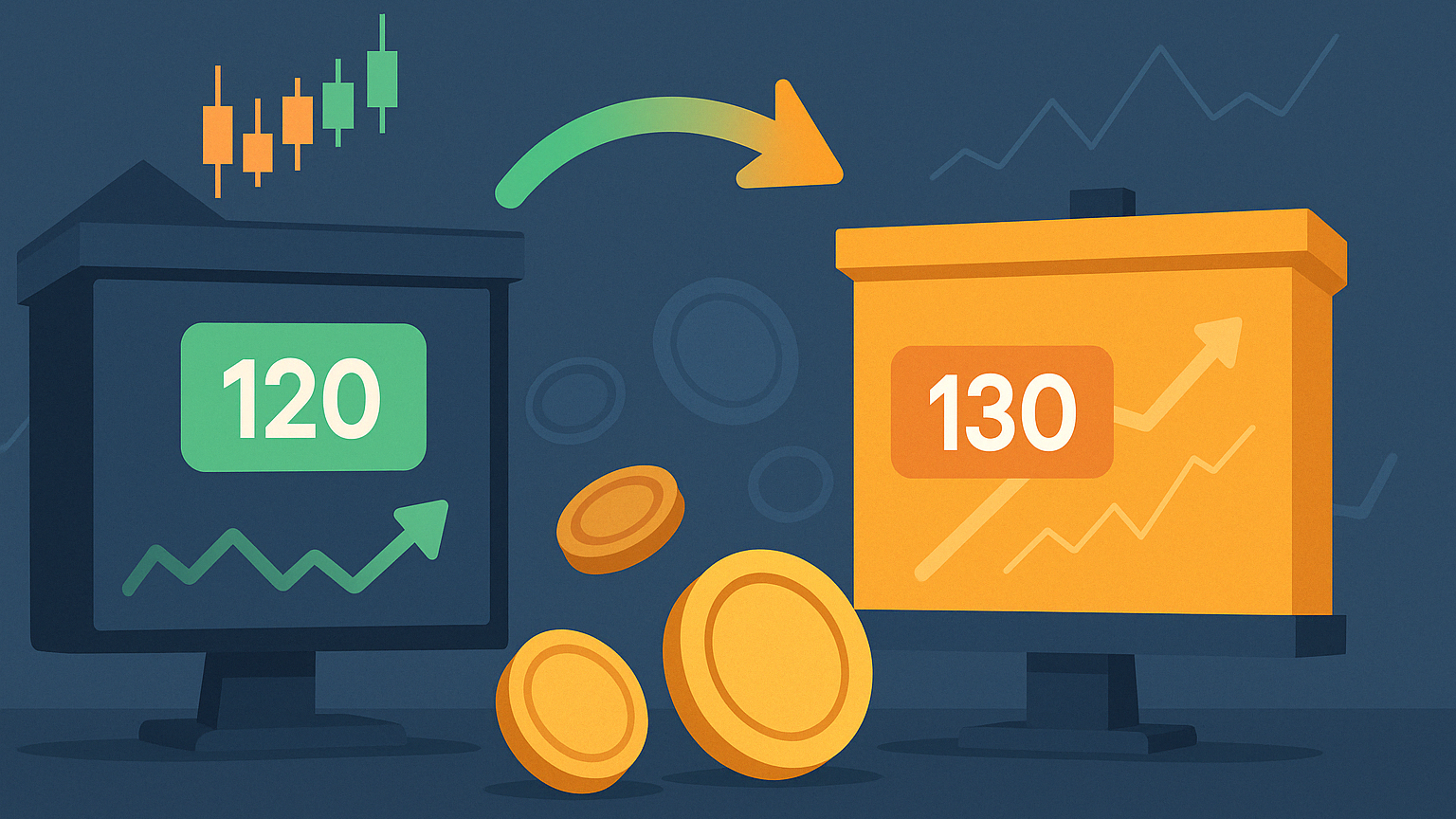Explore how wins and losses impact trading psychology and discover strategies to maintain emotional balance for better trading performance.
Trading psychology is crucial for success in financial markets. Wins can lead to overconfidence, while losses may trigger fear or impulsive decisions. Managing these emotions is key to staying disciplined and making better trading choices. Here's how successful traders handle it:
- Recognize emotional reactions: Wins may inflate confidence; losses can cause fear or rash recovery attempts.
- Address common biases: Overconfidence, loss aversion, and the sunk cost fallacy often distort decision-making.
- Focus on process over outcomes: Stick to your trading plan, set clear goals, and prioritize risk management.
- Use tools for objectivity: Platforms like LuxAlgo provide data-driven insights to reduce emotional bias.
- Build mental resilience: Techniques like mindfulness, journaling, and stress management help maintain balance.
Effects of Wins and Losses on Trading Psychology
Emotional Reactions to Wins and Losses
Trading outcomes often stir up intense emotions that can skew judgment. A series of wins might inflate confidence, leading traders to take unnecessary risks. On the flip side, losses can spark fear or impulsive attempts to recover, both of which can derail disciplined strategies. This emotional rollercoaster can create a false sense of invincibility.
Trading Biases
The psychological toll of trading often leads to cognitive biases that affect decision-making. Here are some common ones:
| Bias Type | Description | Impact on Trading |
|---|---|---|
| Overconfidence | Overestimating one's trading abilities | Ignoring stop-losses, taking excessive risks |
| Loss Aversion | Feeling losses more deeply than gains | Holding onto losing trades, selling winners early |
| Sunk Cost Fallacy | Refusing to abandon a bad trade | Doubling down on losses, avoiding acceptance |
Influence of Risk-Reward and Win-Loss Ratios
These biases shape how traders perceive and handle risk-reward ratios, often leading to poor decisions. Effective risk management, even under emotional stress, helps traders stay on course. Key practices include:
- Setting clear entry and exit points
- Maintaining consistent position sizes
- Adhering to strict risk management guidelines
"Emotions influence decision-making... Trading psychology recognizes that emotional biases can influence a trader's decision-making process. Understanding and managing these emotions are essential for making rational and objective trading decisions" [2]
The foundation of managing trading psychology is accepting losses as a natural part of the process. By using structured methods to minimize emotional decisions, traders can maintain better control and balance in their approach. Recognizing and addressing emotional and cognitive biases is a critical step toward building resilience and improving trading discipline.
Strategies for Emotional Balance in Trading
Effectively managing emotions is key to maintaining steady trading performance. A structured approach can help traders stay resilient and focused.
Learning from Losses
Losses are an unavoidable part of trading, but they can teach valuable lessons. Tools like LuxAlgo's backtesting features allow traders to spot patterns in past trades, helping to refine strategies for the future.
"Trading psychology assists traders in dealing with losses and drawdowns by minimizing the emotional impact and preventing impulsive actions driven by the fear of further losses." [2]
Setting Achievable Goals
Setting realistic goals can reduce stress caused by overly ambitious expectations. Here are three types of goals to consider:
| Goal Type | Description | Implementation Strategy |
|---|---|---|
| Performance-Based | Focus on following trading rules, not profit targets | Monitor adherence to rules and sound risk management |
| Learning-Oriented | Emphasize skill development over quick profits | Define specific learning milestones and track progress |
| Risk Management | Create clear position sizes and drawdown limits | Set and stick to risk parameters |
Focus on Trading Process
Staying emotionally balanced often comes from prioritizing the quality of your process over the outcomes. Here's how:
- Strategy and Execution: Stick to your trading plan and consistently review your performance - entry points, exits, and risk management. Tools like LuxAlgo's indicators offer objective insights to guide these reviews.
- Ongoing Refinement: Regularly analyze past trades and your emotional responses to them. This helps you fine-tune your strategies and improve decision-making over time.
Building Resilience for Trading Success
Mental resilience is a key factor in maintaining consistent trading performance, especially when markets are unpredictable. Strengthening your mindset requires deliberate techniques to help manage emotions and maintain balance.
Techniques for Mental Toughness
Building mental toughness involves daily habits that align with emotional balance strategies. A structured routine can help traders stay calm and composed during tough market conditions.
| Technique | Purpose | Implementation |
|---|---|---|
| Mindfulness Meditation | Helps calm emotions before trading | Practice for 10-15 minutes before markets open |
| Trade Journaling | Tracks decisions and emotional patterns | Document each day's trades and reflections |
| Stress Management | Keeps focus intact under pressure | Use deep breathing techniques during volatile periods |
Avoiding Crowd Behavior
Staying objective is crucial to avoid being swayed by the herd mentality. Independent analysis helps traders make informed decisions. To stay on track:
- Develop and follow a personal research process
- Set clear trade criteria in advance
- Minimize attention to market noise
- Use tools that rely on data for decision-making
"Trading psychology recognizes that emotional biases can influence a trader's decision-making process. Understanding and managing these emotions are essential for making rational and objective trading decisions." [2]
By focusing on your own strategy and resisting external influences, you can maintain the discipline needed for long-term success.
Importance of Patience and Discipline
Consistent trading behavior is essential, whether you're experiencing gains or losses. Patience and discipline are the foundation of a sustainable trading approach.
"Emotions play a pivotal role in trading decisions, often acting as a double-edged sword that can either enhance or hinder performance." [3]
Key practices to develop include:
- Setting clear risk-reward parameters
- Following strict entry and exit rules
- Reviewing performance regularly
- Establishing a daily routine to review strategies and prepare emotionally
These habits help traders build the resilience needed to handle market challenges and stay on course, no matter the conditions.
Tools to Improve Trading Psychology
Modern trading platforms now offer advanced analytics alongside educational resources, making it easier for traders to manage emotions and rely on data for their decisions.
LuxAlgo: Data-Driven Trading Support

LuxAlgo provides a variety of tools designed to help traders make decisions based on data rather than emotions. These include features like price action analysis, trade screeners, and AI-driven backtesting.
| Tool Category | Purpose | Psychological Benefit |
|---|---|---|
| Price Action Toolkits | Analyze trends | Reduces impulsive decision-making |
| Trade Screeners | Filter setups | Simplifies complex choices |
| AI Backtesting | Validate strategies | Builds confidence using historical data |
The platform uses AI-powered analytics to deliver clear, objective signals, helping traders sidestep emotional pitfalls like fear and greed. By following this structured approach, users can make more rational trading decisions. While tools like LuxAlgo focus on providing actionable insights, engaging with trading communities adds an emotional and psychological dimension to the process.
Learning from Communities and Resources
Beyond using advanced tools, traders can gain a lot from participating in trading communities. These communities offer emotional support, practical advice, and the chance to learn from others' experiences. Some of the key benefits include:
- Gaining insights from experienced traders
- Sharing challenges and finding solutions
- Accessing expert advice
- Staying grounded during volatile market conditions
Research shows that nearly 80% of traders face difficulties due to poor emotional control and decision-making under stress [2] . This underscores the importance of combining educational resources and community interaction to build stronger mental discipline.
Platforms like LuxAlgo also foster community engagement by offering 24/7 support from experienced traders and team members. This kind of guidance can be invaluable during uncertain market conditions.
Successful trading often relies on a blend of technical tools and emotional support systems. Using tools for data analysis alongside community discussions helps traders stay balanced and make better decisions. Regularly engaging with educational content and community insights ensures traders develop healthier habits and build emotional resilience.
Conclusion: Mastering Trading Psychology
Trading success depends on balancing your emotions with smart decision-making. Wins and losses can heavily impact your mindset, so it's essential to combine psychological techniques with practical tools to stay on track.
Tools like LuxAlgo provide traders with a structured, data-focused approach to analyzing markets and making decisions. This helps reduce the influence of emotions and biases, keeping your trading process clear and logical.
"The psychological game is as crucial as the market analysis." - Minimalist Trading [1]
Building mental resilience in trading comes down to three key practices:
- Recognizing and managing emotional reactions to wins and losses
- Sticking to disciplined, consistent trading habits
- Relying on data-driven tools to ensure objective decision-making
In this article, we’ve covered how emotions affect trading, strategies to maintain balance, and tools that support logical decisions. Together, these strategies provide a solid foundation for improving your trading mindset.
The key to long-term success lies in controlling emotions, following a disciplined plan, and using technology to make smarter trades. By incorporating these methods into your routine, you can strengthen your mindset and improve your chances of thriving in the markets.







